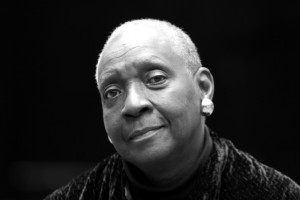
Maryse Condé (*1937) is a francophone writer from Guadeloupe who can be described as a novelist-theorist. In her historical fiction and essays, she tends to put different post- or anticolonial theories and methods to the test. Her critical eye on theory, as well as her frank examinations of post-colonial societies, have led to frequent public arguments, starting with her challenges to negritude and creolization. When welcomed, Condé’s scrutiny has been valued as a ‘dogma guard’ and has raised many questions regarding the possible paths of post-colonial societies. Condé’s work has also been proposed as opening up the ‘post-postcolonial’ (Leservot, 2009).
According to Typhaine Leservot: “Maryse Condé’s contribution to postcolonial theory takes on myriad forms. Firstly, her fiction traverses geographical frontiers and breaks through theoretical barriers between Anglophone and Francophone literatures. As she creates a literary world in which her French Caribbean characters travel back and forth between Anglophone and Francophone areas of the globe, Condé offers a critique of the national and linguistic frontiers that separate Anglophone and Francophone theories and cultures. If she urges scholars to nuance their approach to race and to allow for a more realistic depiction of the black diaspora, she also sharply criticizes male Francophone writers for neglecting Caribbean gender issues and the issue of transnational diasporic Caribbean subjects. Secondly, Condé further challenges postcolonial theory by opening it up to its post-postcolonial possibilities. As her subjects explore issues of identity in a resolutely globalized world, she uses the theoretical reflection born out of Glissant’s concept of creolization to show the relevance of the transnational Caribbean experience to globalization and transnational studies. At the same time, she also suggests that postcolonial subjectivity should never be theorized in such a way as to become dogmatic.
And that is perhaps Condé’s single most important contribution to postcolonial studies: in her fiction, postcolonial subjects are subjects first, and postcolonial second. As such, her characters are only partially indebted to the colonial history that preceded them and they remain free, to a certain extent, to make choices based on the present-day reality that surrounds them. Although Condé runs the risk of sounding reactionary, a criticism she faced after her first novel in 1976, she intelligently raises a question that transcends as well as widens postcolonial studies: at what point does the colonial history of a people diminish in importance as new conditions arise?”
Essential Reading:
Condé, Maryse (2014) The Journey of a Caribbean Writer. London: Seagull Books.
Condé, Maryse (2000 [1982]) Heremakhonon. Boulder, CO: Lynne Rienner.
Condé, Maryse (1992 [1986]) I, Tituba, Black Witch of Salem. (Foreword by Angela Davis). Charlottesville, VA: University of Virginia Press.
Further Reading:
Barbour, Sarah, and Gerise Herndon (eds.), 2006. Emerging Perspectives on Maryse Condé: A Writer of Her Own (Trenton, NJ: Africa World Press).
Condé, Maryse, Rebecca Wolff (2014) Maryse Condé (Interview by Rebecca Wolff). BOMB: The Author Interviews. Brooklyn, NY: Soho Press.
Leservot, Typhaine (2009) ‘Maryse Condé: Post-Postcolonial?’ In: C. Forsdick and D. Murphy: Postcolonial Thought in the French-speaking World. Liverpool: Liverpool University Press.
Questions:
How does Maryse Condé probe constructs such as race, ethnicity, geography, belonging, gender, culture, matter and history? (Choose one or more)
Why could Maryse Condé’s work be considered ‘post-postcolonial’?
Find and examine responses (essays, comments under youtube videos, newspaper articles etc) to one of Maryse Condé’s novels or essays.
How does Maryse Condé theorise through fiction?
Submitted by Angela Last